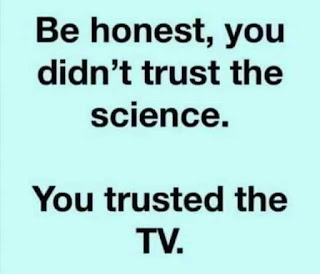Cartoonist Scott Adams admitted the other day that the "anti-vaxxers"--meaning people who didn't want an experimental COVID shot--had "won." Like Emily "we were all in the dark" Oster, he chalked up his loss to bad luck instead of his own bad judgment.
I would like to publicly apologize for continuously ignoring the "accurate data" on Covid that people sent me for three years.
— Scott Adams (@ScottAdamsSays) January 24, 2023
But just so I don't make that mistake again, is there a separate list of the strangers I should trust to know which data is the good stuff?
Sorry, Scott, but there's no substitute for doing your own research using primary sources and learning how to read those sources. It's like the first three rules from Joel Greenblatt's book You can be a Stock Market Genius:
- Do your own work.
- Don't trust anyone over 30.
- Don't trust anyone 30 or under.
Get it? Sinking your fortune or your health into something you haven't carefully researched is risky. As for following the experts (under 30, over 30 or otherwise), these experts don't work for you, they don't suffer any consequences for being wrong, and renegades who pan a stock or pharmaceutical get excommunicated.
Even though COVID dissidents were censored, information and lessons on interpretation were out there. Dr. Sebastian Rushworth's book COVID: Why Most of What you Know is Wrong explained, succinctly and in laymen's terms, scientific studies and statistics. Looking at Pfizer's own study, he called the number of severe adverse events "concerning" and observed that Pfizer didn't say what those events were. And--the book is from 2021--he noted, "none of these studies has looked into whether these vaccines prevent those who have been vaccinated from spreading the infection to others, so there is at present no data to support that claim." Dr. Rushworth was less concerned about the Moderna shot, but he was right about the rest simply by reading and interpreting the drug companies' own studies. All of this was presented in a way where you could check his work instead of taking him on faith.
Maybe not many people saw that book. Fair enough--but every state had COVID dashboards where you could see the overwhelming majority of deaths were among the old and the metabolically unhealthy. Independent journalist Alex Berenson was on Twitter and then Substack reporting on the shots; nurse John Campbell, Dr. Suneel Dhand, Dr. Vinay Prasad, biologists Brett Weinstein and Heather Heying and others were on YouTube interpreting COVID studies and news. For a while, YouTube had local TV news videos every day of people who'd suffered severe adverse reactions to the COVID shot. Plenty of information was out there for people willing to do their own work--or at least listen to others who had.
But there was something even more basic: the "vaccines" were novel, experimental-stage medical products created, tested and marketed by an industry with a spotty safety record. The people least insulated from disaster--the poor and least educated--were the most wary even if they couldn't explain why.
To be fair to Scott Adams, there were people who more lucky than right. Some of them will take a loss when their child suffers or dies from an entirely preventable disease. But putting all of us in that category by calling us "anti-vaxxers" is intellectually dishonest and a disqualification for Team Reality.
UPDATE:
if scott is sincere here, his own "blocked" list would be a good start.
— el gato malo (@boriquagato) January 24, 2023
he blocked me back in 2020. i would guess he's got fully half of "rational ground" blocked.
hard to assess data you do not allow yourself to see... pic.twitter.com/7bHIKhtrFZ

Comments